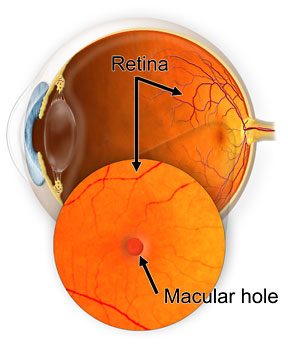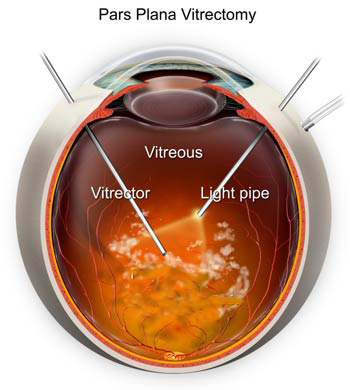Narciso F. Atienza, Jr. MD, MBA, FPAO, FPCS
EYE PHYSICIAN AND SURGEON
FELLOW, PHILIPPINE COLLEGE OF SURGEONS
FELLOW, PHILIPPINE ACADEMY OF OPHTHALMOLOGY
DIPLOMATE, PHILIPPINE BOARD OF OPHTHALMOLOGY
SUBSPECIALTY IN DISEASES AND SURGERY OF THE RETINA, VITREOUS, AND MACULA and OCULAR ONCOLOGY
FELLOW, PHILIPPINE COLLEGE OF SURGEONS
FELLOW, PHILIPPINE ACADEMY OF OPHTHALMOLOGY
DIPLOMATE, PHILIPPINE BOARD OF OPHTHALMOLOGY
SUBSPECIALTY IN DISEASES AND SURGERY OF THE RETINA, VITREOUS, AND MACULA and OCULAR ONCOLOGY

What is macular hole?
The macula normally lies flat against the back of the eye, like film lining the back of a camera
A macular hole is an abnormal opening that forms at the center of the macula over a period of several weeks to months.
What are the symptoms of macular hole?
In the early stages of hole formation, vision becomes blurred and distorted. If the hole progresses, a blind spot develops in the central vision, similar to the picture you would get if your camera film had a hole in it. Side vision remains normal, and there is no pain. It is uncommon for a macular hole to occur in both eyes
Vision loss can vary from hardly noticeable to severe. One or both eyes may be involved. For most people, vision remains stable and does not get progressively worse.
What causes macular holes?
Most macular holes occur in the elderly. The vitreous gel within the eye pulls on the thin tissue of the macula until it tears. The torn area gradually enlarges to form a round hole. Less common causes of macular holes include injury and long term swelling of the macula. No specific medical problems are known to cause macular holes
What testing might be done?
Your ophthalmologists can diagnose a macular pucker by looking inside your eye with special instruments. A photographic test called fluorescein angiogram and another test called an OCT (optical coherence tomogram) may be done in order to determine the extent of the damage to the macula.
Does macular hole need to be treated?
Eyedrops, medicines, or laser surgery nor a change in glasses will not improve your vision.
Depending on the cause and the duration of macular holes, vitrectomy surgery is the only treatment that can repair a macular hole and possibly improve vision. Low vision devices may help people manage their daily activities if central vision is damaged on both eyes.
Your regular ophthalmologist will refer you to a retina surgeon ((an ophthalmologist who has undergone at least one year in clinical fellowship in retinal surgery, and is practicing fulltime in this subspecialty) to manage your macular hole.
During vitrectomy surgery, the retina surgeon will use very delicate and fine instruments inside the eye to remove the vitreous gel and membrane which is wrinkling and pulling on the macula.
The eye is then filled up with a special gas or silicone oil, depending whether you can assume a face down position for at least 10 days. The gas is used when the patient can assume the positioning, while the oil is used when the patient will have extreme difficulty assuming the face down position or, has to do air travel within 2 months. The actual operation takes about 45 minutes to 75 minutes to complete and is performed in the operating room under local anesthetic. Placing silicone oil instead of gas will require another procedure to remove the oil when the hole has closed. This is usually done after 1-3 months after the surgery
After the surgery, the patient MUST maintain a constant face down position for 7 – 10 days, if you have a gas bubble, depending on the discretion of your doctor. This is to keep the macula in contact with the gas bubble, keeping it flat. The macular hole usually closes and the eye slowly regains part of the lost sight. Vision does not usually return all the way normal. The visual outcome may depend on 1) how long the hole was present, 2) maintenance of the face down position. 3) experience of your retinal surgeon doing the surgery, 4) if you have had cataract surgery before. If you haven’t had cataract surgery, it is likely that you will have it within one year. Cataract surgery ALONE, will not cause any improvement of your central vision.
Complications are uncommon, but may happen, and this include
• Acclererated cataract formation
• Bleeding
• Infection
• Retinal detachment
• Re-occurrence of the macular pucker
This occur in a very low rate, that the surgery is more in favor for the patient.
YOU MAY NOT FLY IN AN AIRPLANE, ASCEND TO HIGH ALTITUDE, SCUBA DIVE, OR UNDERGO GENERAL ANESTHESTIC as any of these could result in a sharp rise in the pressure in your eye with possible eye damage.
Surgery is not necessary for everyone who has a macular hole. Some people have normal vision in the other eye may not be troubled enough to want surgery.
Why are regular medical eye examinations important for everyone?
Eye diseases can strike at any age. Many eye diseases do not cause symptoms until the disease has done damage. Since most blindness is preventable if diagnosed and treated early, regular medical examinations by an ophthalmologist are very important.
The macula normally lies flat against the back of the eye, like film lining the back of a camera
A macular hole is an abnormal opening that forms at the center of the macula over a period of several weeks to months.
What are the symptoms of macular hole?
In the early stages of hole formation, vision becomes blurred and distorted. If the hole progresses, a blind spot develops in the central vision, similar to the picture you would get if your camera film had a hole in it. Side vision remains normal, and there is no pain. It is uncommon for a macular hole to occur in both eyes
Vision loss can vary from hardly noticeable to severe. One or both eyes may be involved. For most people, vision remains stable and does not get progressively worse.
What causes macular holes?
Most macular holes occur in the elderly. The vitreous gel within the eye pulls on the thin tissue of the macula until it tears. The torn area gradually enlarges to form a round hole. Less common causes of macular holes include injury and long term swelling of the macula. No specific medical problems are known to cause macular holes
What testing might be done?
Your ophthalmologists can diagnose a macular pucker by looking inside your eye with special instruments. A photographic test called fluorescein angiogram and another test called an OCT (optical coherence tomogram) may be done in order to determine the extent of the damage to the macula.
Does macular hole need to be treated?
Eyedrops, medicines, or laser surgery nor a change in glasses will not improve your vision.
Depending on the cause and the duration of macular holes, vitrectomy surgery is the only treatment that can repair a macular hole and possibly improve vision. Low vision devices may help people manage their daily activities if central vision is damaged on both eyes.
Your regular ophthalmologist will refer you to a retina surgeon ((an ophthalmologist who has undergone at least one year in clinical fellowship in retinal surgery, and is practicing fulltime in this subspecialty) to manage your macular hole.
During vitrectomy surgery, the retina surgeon will use very delicate and fine instruments inside the eye to remove the vitreous gel and membrane which is wrinkling and pulling on the macula.
The eye is then filled up with a special gas or silicone oil, depending whether you can assume a face down position for at least 10 days. The gas is used when the patient can assume the positioning, while the oil is used when the patient will have extreme difficulty assuming the face down position or, has to do air travel within 2 months. The actual operation takes about 45 minutes to 75 minutes to complete and is performed in the operating room under local anesthetic. Placing silicone oil instead of gas will require another procedure to remove the oil when the hole has closed. This is usually done after 1-3 months after the surgery
After the surgery, the patient MUST maintain a constant face down position for 7 – 10 days, if you have a gas bubble, depending on the discretion of your doctor. This is to keep the macula in contact with the gas bubble, keeping it flat. The macular hole usually closes and the eye slowly regains part of the lost sight. Vision does not usually return all the way normal. The visual outcome may depend on 1) how long the hole was present, 2) maintenance of the face down position. 3) experience of your retinal surgeon doing the surgery, 4) if you have had cataract surgery before. If you haven’t had cataract surgery, it is likely that you will have it within one year. Cataract surgery ALONE, will not cause any improvement of your central vision.
Complications are uncommon, but may happen, and this include
• Acclererated cataract formation
• Bleeding
• Infection
• Retinal detachment
• Re-occurrence of the macular pucker
This occur in a very low rate, that the surgery is more in favor for the patient.
YOU MAY NOT FLY IN AN AIRPLANE, ASCEND TO HIGH ALTITUDE, SCUBA DIVE, OR UNDERGO GENERAL ANESTHESTIC as any of these could result in a sharp rise in the pressure in your eye with possible eye damage.
Surgery is not necessary for everyone who has a macular hole. Some people have normal vision in the other eye may not be troubled enough to want surgery.
Why are regular medical eye examinations important for everyone?
Eye diseases can strike at any age. Many eye diseases do not cause symptoms until the disease has done damage. Since most blindness is preventable if diagnosed and treated early, regular medical examinations by an ophthalmologist are very important.



